- Home
- What are Heat Pumps
- Air Source Heat Pumps
Air Heat Pumps
Air heat pumps or air source heat pumps, as they’re also referred to, are potentially a great way of reducing the heating costs for your home.
However, there are some things that you'll need to consider, which you may not have thought of.
It’s all too easy to get carried away with the sales pitch and brochure which will normally bestow the virtues of the given technology without pointing out the disadvantages of the system.
Thankfully I’m here to tell it as it is, and air heat pumps are no exception.
So, what is an air source or air heat pump?
An air source heat pump is basically an energy efficient boiler and as such works in the same way any of the traditional energy efficient boilers work. They heat water which then heats your under floor heating pipes or large panel radiators and your domestic hot water.
They just use electricity as a fuel instead of gas or oil.
They also work on the same principle as ground source and water source heat pumps. They extract heat from the surrounding media (air, water or ground) and transfer it into the hot water in your heating system (for more detailed information read my article on how heat pumps work).
Why would you choose an air heat pump over the others?
There is no hard and fast rule to choosing one over the other.
Ground source heat pumps are quite popular in the UK and Ireland but the cost of digging the trenches or drilling the bore holes tends to be quite expensive, which can put them out of the reach of many of us.
On the plus side, a ground source heat pump will work at lower air temperatures, provided you have buried the pipe-work deep enough.
Water source heat pumps aren’t as common as few of us own a pond (which is large enough) or a lake. If however you do own a suitable expanse of water then a water source heat pump may be a viable option for you and works the exact same way as a ground source system.
It’s only with recent technological advances that air source heat pumps have really come into their own.
In the past they used single speed heat pumps, which meant they ran at a constant speed and used a lot of electricity. Now however, most are manufactured with inverters which vary the heat output to when it is needed, thus reducing the running costs and therefore your electricity bill.
Why have a heat pump at all?
I’m sure like me you’re constantly trying to think of ways to lessen the running costs of your home. You may be surprised to hear that around three quarters of the total energy used in your house goes to heating your domestic hot water and domestic heating.
So if you can reduce the running costs of your heating and hot water you could make a sizeable difference to your bills.
Advantages of Air Heat Pumps:
- They extract heat from the air which is constantly available and free.
- Air heat pumps can operate in temperatures as low as -20ºC so they're perfectly well suited to use in the UK and Ireland.
- Installation costs aren’t much more than a traditional heating system when installing into a new build, as you would have to buy a boiler and water cylinder anyway (and maybe even an oil or LPG tank as well).
- You can use your photovoltaic panels or wind turbine to help produce renewable electricity to run your air source heat pump.
- Efficiency – every 1kW of electricity used can produce around 3kW of heat energy to heat your home and domestic hot water.
They can be used as a direct replacement for your boiler as they only require an electrical supply and a water supply.
- Air heat pumps are ideal for use with under-floor heating as the heat pump will produce water at around 30-45ºC. Traditional radiators would typically be heated to around 65ºC.
- By installing an air source heat pump it’s possible to achieve level 4 of the Code for Sustainable Homes (check with your individual supplier) or even higher if used in conjunction with PV panels and other renewable technologies.
- They should come under permitted development meaning you won’t need planning permission to install them (but as always, check with your planners first).
- The VAT on an air source heat pump is only 5% as it’s a low carbon technology.
- If installed by an MCS (Micro-generation Certification Scheme) accredited firm you should be eligible for the renewable heat incentive payments.
- You won’t be tied to increasing oil or gas prices.
- Although results will vary from supplier to supplier, an air heat pump should offer savings over natural gas, LPG and oil fired heating systems.
Disadvantages of Air Heat Pumps:
- Air heat pumps run on electricity so your electricity bill will likely increase, (but you won’t get any gas or oil bills).
- They won't heat you domestic hot water high enough so you will need to use a backup system such as an immersion heater, solar thermal panels or a wood burning stove etc.
- Retro-fitting is more expensive as you already have a boiler and water cylinder yet both will have to be replaced to install an air source heat pump.
- They do have to be located externally so that they get a constant supply of air from which to extract heat. If you were to install one of these inside your home you would turn your house into a giant freezer (literally).
- They are better suited to underfloor heating, unless you are happy with radiators running at a lower temperature.
- You’ll have to fit a new twin coil hot water cylinder with different controls.
- You’ll be tied to increasing electricity prices, but if you produce your own electricity on-site from a wind turbine or from photovoltaic panels, this impact will be lessened.
When looking at heat pumps you should look at the CoP figures (Coefficient of Performance) which is the ratio of heat delivered by the heat pump to the power the unit consumes.
Also ask what the CoP figures are at various temperatures such as -5ºC during the winter. The CoP will drop as the outside temperature drops.
Before you rush out to buy an air heat pump, as with any green technologies you’ll read about on this site, you really need to carry out some basic home improvements before fitting in order to get the best out of your heat pump.
These improvements involve basic things like increasing or adding insulation to the walls and roof of your home and reducing any drafts.
By increasing the thermal efficiency of your home before installation you'll maximise the benefits and reduce the running costs of your air source heat pump.
The longer you can keep the heat in your home, the less heat your air heat pump will have to produce.
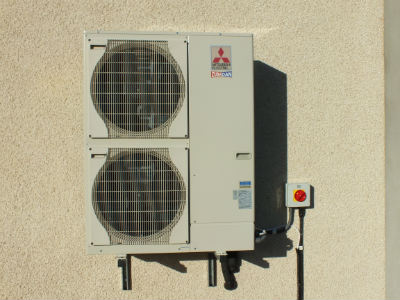
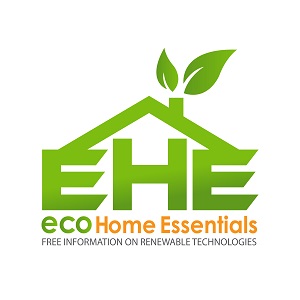
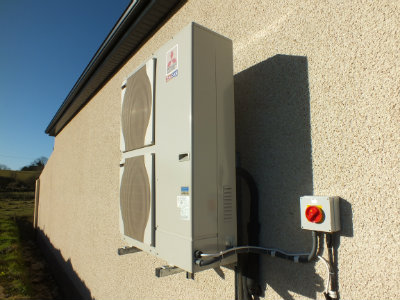


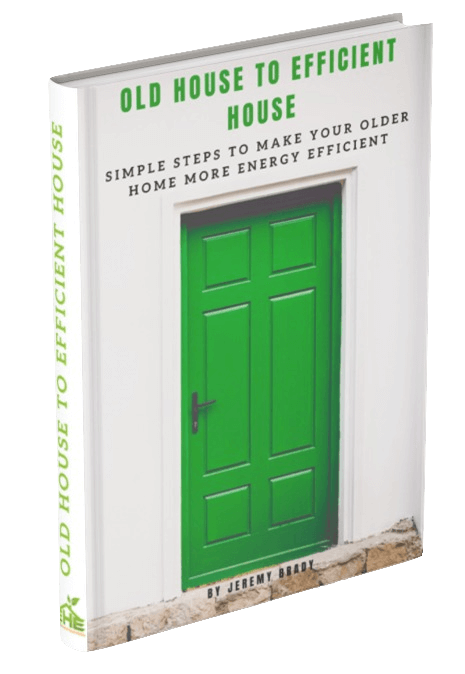





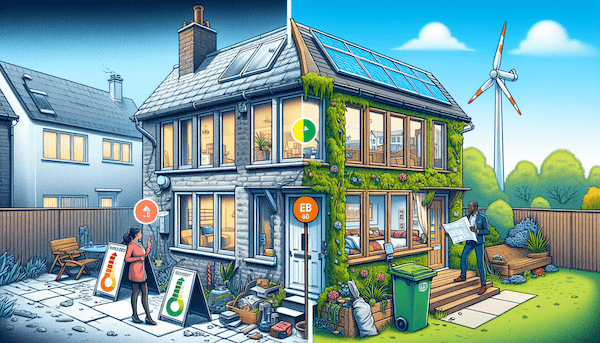
New! Comments
Have your say about what you just read! Leave me a comment in the box below.